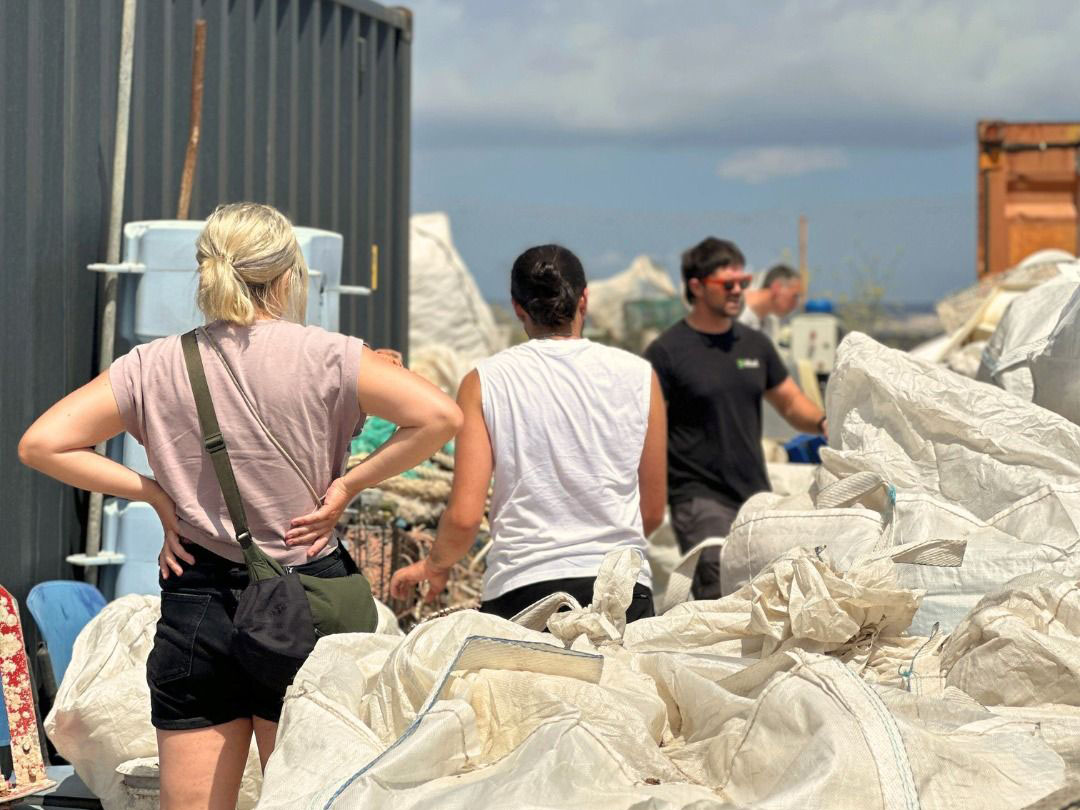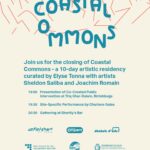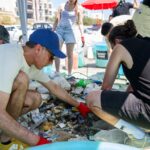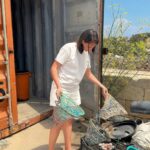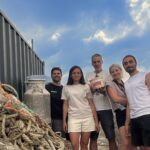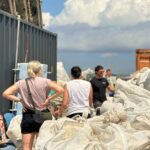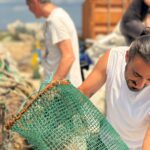OTRart: Coastal Commons was a socially-engaged, site-specific initiative that explored how coastal spaces can be reimagined through collective care, material reuse and artistic interventions.
It sat within the broader project OTRart, which engages with environmental sustainability through artistic discourse, by working with artists who engage in sustainable artistic practices, and who view waste or recycled material as a valuable resource.
Rooted in the idea of the commons, a space shaped not by ownership but by shared use and responsibility, the project brings together artists, communities, environmental organisations and everyday users of public space to reflect on what coastal sites mean, what they hold and how they might be lived in differently.
Coastal Commons unfolded through a process of observation, conversation and co-creation. It asks how the coastline is already used, remembered and contested and offers something back that is useful, adaptable and collectively formed.
Coastal spaces like Birżebbuġa are always in flux: they are shaped by the movement of the sea, human interventions, collective memory and environmental impact. They are places of coexistence and contradiction, where tourism, local rhythms, ecological degradation and cultural traditions meet. Coastal Commons embraces this in-betweenness, asking what role art can play in creating functional, inclusive and shared interventions.
Birżebbuġa 2025: The Site and Process
Coastal Commons took place in a paved public site along the Birżebbuġa waterfront: a space often passed through, but rarely paused in. This location was selected through a community focus group involving local residents and participants from previous urban action projects. Together, participants reflected on past interventions, mapped the village’s rhythms and identified spaces of potential.
Curator Elyse Tonna led a series of workshops, site walks and engagement activities to collaboratively explore and understand the site with local residents and other stakeholders.
Artists Joachim Romain and Sheldon Saliba participated actively throughout this process, contributing to shared conversations, on-site reflection and material experimentation.
A coastal clean-up held on 21 June 2025, organised in collaboration with żibel, provided the materials: primarily disused fishing nets and jerry cans, which became central to the co-created modular intervention.
These materials not only reflect the environmental pressures visible along Malta’s coast, but also became a way to reclaim and reimagine public space through transformation and use.
The Outcome
The final outcome was a co-created open storage structure holding 11 multifunctional objects. These pieces were made from marine waste and designed for flexibility, movement and everyday use by anyone who encounters them.
Each object can become:
A seat to rest. A step to reach. A table to gather. A rest for your legs. A weight to hold. A workbench to make. A box with a game. A structure to share.
They can be moved, stacked, used alone or together. Their purpose is not fixed: they respond to the space and the people who inhabit it.
Given the liminality and layered use of the site, the intention was not to impose a fixed object or define a single function. Instead, these modular pieces were created to remain open and adaptable: tools that respond to a range of needs and behaviours. They invite use beyond what was originally imagined, extending their life through the creativity and actions of those who encounter them.
This is a shared set of possibilities, shaped by context, movement and collective use.
The final works were presented to the public on 27 June 2025, with a community event and intervention by local artist Charlene Galea.
The Team
Produced by: Unfinished Art Space
Curated by: Elyse Tonna
Artists: Joachim Romain and Sheldon Saliba
Project Manager: Marcon Borg Caruana
Communications Manager: Maria Eileen Fsadni
Production Coordinator: Martina Spiteri
Graphic Design: 2point3 Studio
Collaborating Organisations: NGO Żibel & Birżebbuġa Local Council
Special thanks to: Aidan Celeste, Andrew Schembri, Camille Roman, Eric Attard, Erik Vella, Francesco Grech, Mattea Ciantar, Martina Darmanin, Yolande Attard, Meltem Ezer, Rachel Mifsud, Samuel Ciantar, Sephora Ciantar, Thrisianne Busuttil, Cristina Macelli, Andrea Azzopardi, Nathan Goodhand, Miguel Cachia, Alessandro Salerno, Mark Piscopo, Robert Hrycikowski, Alex Turnbull, Grouse Attard, Scott Camilleri, Elisa von Brockdorff, Niels Plotard, Deborah Galea

